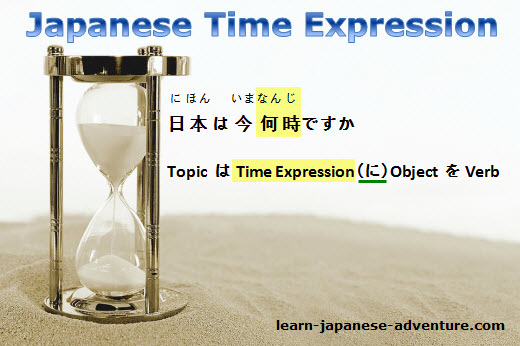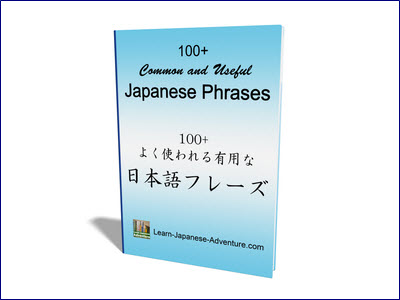- Home
- Basic Lessons
- Japanese Time Expression
Showing Japanese Time
Expression in a sentence -
Free Japanese Lessons: 10
Sentence showing Japanese time expression can be formed using either Noun sentence or Verb sentence.
You will learn how to form sentences showing time and some required particles in this lesson.

So far I have not touched on Japanese verbs yet, but I will give some examples using simple verb sentences.
Please refer to Japanese lesson 18 and onwards for lessons on Japanese verbs and related topics.
You should first take a look at the sections on Japanese time and Japanese Day Month Week to familiarize with how to read time in Japanese.
Let's start with using Noun sentence to show Japanese time expression.
Japanese Time Expression using Noun Sentence
"What is the time now?" How to say it in Japanese? The simplest is to use the following Noun sentence expression...
Topic はいまなんじですか
Topic wa ima nanji desu ka
Meaning: What is the time now in Topic?
For example, you can say...
- Question: にほんはいまなんじですか。
nihon wa ima nanji desu ka
Meaning: What is the time now in Japan?
Answer: にほんはいまごごさんじです。
nihon wa ima gogo sanji desu
Meaning: It is 3pm now in Japan.
Japanese Time Expression using から (kara) and まで (made)
You can use the particles から (kara) and まで (made) to state the time frame from which an event occurs. You can use the following expressions...
Topic はなんじからですか
Topic wa nanji kara desu ka
Meaning: What is the starting time for Topic?
Topic はなんじまでですか
Topic wa nanji made desu ka
Meaning: What is the ending time for Topic?
Topic はなんじからなんじまでですか
Topic wa nanji kara nanji made desu ka
Meaning: What is the starting and ending time for Topic?
The above expressions are best used to ask for the operating time for supermarkets, banks, clinics or works, etc.
- Question: ぎんこうはなんじからですか。
ginkou wa nanji kara desu ka
Meaning: What is the opening time for the bank?)
Answer: ぎんこうはごぜんくじからです。
ginkou wa gozen kuji kara desu
Meaning: The bank opens at 9am.
- Question: しごとはなんじまでですか。
shigoto wa nanji made desu ka
Meaning: What is the time that your work ends?
Answer: しごとはごじまでです。
shigoto wa goji made desu
Meaning: My work ends at 5pm.
- Question: スーパーはなんじからなんじまでですか。
su-pa- wa nanji kara nanji made desu ka
Meaning: What is the operating time for the supermarket?
Answer: スーパーはごぜんじゅうじからごごじゅうじまでです。
su-pa wa gozen juuji kara gogo juuji made desu
Meaning: The supermarket opens at 10am and closes at 10pm.
If you want to ask about which day the bank is closed, use the following expression...
- Question: ぎんこうのやすみのひはなんようびですか。
ginkou no yasuminohi wa nanyoubi desu ka
Meaning: What is the rest day for the bank?
Answer: ぎんこうのやすみのひはどようびとにちようびです。
ginkou no yasuminohi wa doyoubi to nichiyoubi desu
Meaning: The rest days for the bank are Saturday and Sunday.
Similarly, to ask which month, you can say なんがつ (nangatsu).
Generally, if you want to ask when something will be happened without specifying hour, day or month, the question word is いつ (itsu). For example...
- Question: やすみのひはいつですか。
yasuminohi wa itsu desu ka
Meaning: When is your rest day?
Japanese Time Expression using Verb Sentence
When using verb sentence to ask about starting or ending time, what time someone wake up or go to bed, use the following expressions...
Topic はなんじにはじまりますか
Topic wa nanji ni hajimarimasu ka
Meaning: When does the Topic start?
Topic はなんじにおわりますか
Topic wa nanji ni owarimasu ka
Meaning: When does the Topic end?
Topic はなんじにおきますか
Topic wa nanji ni okimasu ka
Meaning: When does the Topic wake up?
Topic はなんじにねますか
Topic wa nanji ni nemasu ka
Meaning: When does the Topic go to bed?
For example...
- Question: じゅぎょうはなんじにはじまりますか。
jugyou wa nanji ni hajimarimasu ka
Meaning: When is the lesson starts?
- Question: じゅぎょうはなんじにおわりますか。
jugyou wa nanji ni owarimasu ka
Meaning: When is the lesson ends?
- Question: あなたはなんじにおきますか。
anata wa nanji ni okimasu ka
Meaning: When do you wake up?
- Question: あなたはなんじにねますか。
anata wa nanji ni nemasu ka
Meaning: When do you go to bed?
Point to note is that when using verb sentence for Japanese time expression, you must use the particle に (ni).
However, there are certain time expressions where に (ni) is not required. See below (end of this page) for the lists.
Normally for verb sentence, the format is Object を Verb. However, the above 4 verbs...
- はじまります (hajimarimasu) - start
- おわります (owarimasu) - end
- おきます (okimasu) - wake up
- ねます (nemasu) - go to bed
... are some exceptions where the object is not required.
Typically a verb sentence with Japanese time expression will be...
Topic は Time Expression (に) Object を Verb
Let use some examples to show the above expression...
- わたしはまいあさしちじ にあさごはんをたべます。
watashi wa maiasa shichiji ni asagohan wo tabemasu
Meaning: I eat breakfast at 7am every morning.
- わたしはまいにちコーヒーをさんばいのみます。
watashi wa mainichi ko-hi- wo sanbai nomimasu
Meaning: I drink 3 cups of coffee every day.
- わたしはまいしゅうすいようび にせんたくをします。
watashi wa maishuu suiyoubi ni sentaku wo shimasu
Meaning: I do my washing/laundry every Wednesday.
- わたしはこんばんえいがをみます。
watashi wa konban eiga wo mimasu
Meaning: I am going to watch movie tonight.
You can also use the general question word いつ (itsu) to ask about timing with verb sentence instead of asking the specific time for the Japanese time expression...
- Question: あなたはいつにほんへいきますか。
anata wa itsu nihon e ikimasu ka
Meaning: When do you go to Japan?
Or you can ask directly which month and which day with verb sentence...
- Question: あなたはなんがつなんにち に にほんへいきますか。
anata wa nangatsu nannichi ni nihon e ikimas ka
Meaning: What is the date that you go to Japan?
Answer: わたしははちがつふつか に にほんへいきます。
watashi wa hachigatsu futsuka ni nihon e ikimasu
Meaning: I go to Japan on 2nd of August.
The following 2 lists show those Japanese time expressions that require the particle に (ni) and those that do not require に (ni).
Japanese Time Expressions that Require に (ni) for Verb Sentence
| Kanji | Hiragana | Romaji | Meaning | |
| 1. | ~年 | ~ねん | ~nen | ~Year |
| 2. | ~月 | ~がつ | ~gatsu | ~Month |
| 3. | 一日 | ついたち | tsuitachi | 1st day of the month |
| 4. | ~日 | ~か | ~ka | ~Day |
| 5. | ~日 | ~にち | ~nichi | ~Day |
| 6. | ~曜日 | ~ようび | ~youbi | ~Day of the Week |
| 7. | ~時 | ~じ | ~ji | ~Hour |
| 8. | ~分 | ~ふん | ~fun | ~Minute |
| 9. | 休みの日 | やすみのひ | yasuminohi | Rest Day/Off Day |
| 10. | 昼休み | ひるやすみ | hiruyasumi | Lunch Break |
| 11. | 夏休み | なつやすみ | natsuyasumi | Summer Vacation |
| 12. | 冬休み | ふゆやすみ | fuyuyasumi | Winter Vacation |
| 13. | 誕生日 | たんじょうび | tanjoubi | Birthday |
Japanese Time Expressions that DON'T Require に (ni) for Verb Sentence
| Kanji | Hiragana | Romaji | Meaning | |
| 1. | 去年 | きょねん | kyonen | Last Year |
| 2. | 今年 | ことし | kotoshi | This Year |
| 3. | 来年 | らいねん | rainen | Next Year |
| 4. | 先月 | せんげつ | sengetsu | Last Month |
| 5. | 今月 | こんげつ | kongetsu | This Month |
| 6. | 来月 | らいげつ | raigetsu | Next Month |
| 7. | 先週 | せんしゅう | senshuu | Last Week |
| 8. | 今週 | こんしゅう | konshuu | This Week |
| 9. | 来週 | らいしゅう | raishuu | Next Week |
| 10. | 一昨日 | おととい | ototoi | The Day Before Yesterday |
| 11. | 昨日 | きのう | kinou | Yesterday |
| 12. | 今日 | きょう | kyou | Today |
| 13. | 明日 | あした | ashita | Tomorrow |
| 14. | 明後日 | あさって | asatte | The Day after Tomorrow |
| 15. | 昨夜 | ゆうべ | yuube | Last Night |
| 16. | 今朝 | けさ | kesa | This Morning |
| 17. | 今晩 | こんばん | konban | Tonight |
| 18. | 今 | いま | ima | Now |
| 19. | 毎週 | まいしゅう | maishuu | Every Week |
| 20. | 毎日 | まいにち | mainichi | Every Day |
| 21. | 毎朝 | まいあさ | maiasa | Every Morning |
| 22. | 毎晩 | まいばん | maiban | Every Night |
| 23. | いつも | itsumo | Always | |
| 24. | 朝 | あさ | asa | Morning |
| 25. | 夜 | よる | yoru | Night |
| 26. | 春 | はる | haru | Spring |
| 27. | 夏 | なつ | natsu | Summer |
| 28. | 秋 | あき | aki | Autumn |
| 29. | 冬 | ふゆ | fuyu | Winter |
| 30. | 昔 | むかし | mukashi | In the Past/In the Old Days |
| 31. | この前 | このまえ | konomae | The Other Day/Recently |
| 32. | この間 | このあいだ | konoaida | The Other Day/Recently |
| 33. | いつ | itsu | When |
The above 2 lists of Japanese time expression are not exhaustive, but you should get the idea which are those that require に (ni).
Take The Challenge Sales! Get 45% OFF Premium & Premium PLUS! Ends on 16 Jan 2026
Click Here to Get 45% OFF Premium & Premium PLUS and be on the fast track to fluency in Japanese.
The link above is an affiliate link, which means that I would earn a commission (at no extra cost to you) if you do end up purchasing the related learning course.
Previous - Lesson 9: Japanese Likes and Dislikes
Buy me a coffee









Facebook Comments
Don’t see the comments box? Log in to your Facebook account, give Facebook consent, then return to this page and refresh it.